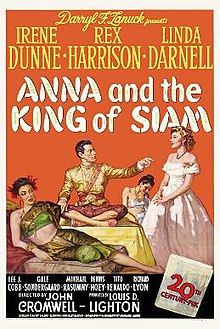| Anna and the King of Siam | |
|---|---|
 Original U.S. Poster | |
| Directed by | John Cromwell |
| Screenplay by | Talbot Jennings Sally Benson |
| Based on | Anna and the King of Siam 1944 novel by Margaret Landon |
| Produced by | Louis D. Lighton |
| Starring | Irene Dunne Rex Harrison Linda Darnell |
| Cinematography | Arthur C. Miller |
| Edited by | Harmon Jones |
| Music by | Bernard Herrmann |
Production company | |
| Distributed by | Twentieth Century Fox |
Release date |
|
Running time | 128 minutes |
| Language | English |
| Box office | $3.5 million (US rentals)[1][2] |
Anna and the King of Siam is an American 1946 drama film directed by John Cromwell. An adaptation of the 1944 novel of the same name by Margaret Landon, it was based on the fictionalized diaries of Anna Leonowens, an Anglo-Indian woman who claimed to be British and became governess in the Royal Court of Siam (now modern Thailand) during the 1860s. Darryl F. Zanuck read Landon's book in galleys and immediately bought the film rights.
The story mainly concerns the culture clash of the Imperialist Victorian values of the British Empire with the autocratic rule of Siam's King Mongkut. The successful film starred Rex Harrison as the king and Irene Dunne as Anna. At the 19th Academy Awards ceremony, the film received two Oscars; for Best Cinematography and Best Art Direction (Lyle R. Wheeler, William S. Darling, Thomas Little, Frank E. Hughes).[3] Also nominated were Bernard Herrmann for the score, the screenwriters and supporting actress Gale Sondergaard.
Landon's novel was later adapted by Rodgers and Hammerstein for their 1951 stage musical The King and I and subsequent 1956 film of the same name. American film director Andy Tennant remade the film in 1999 as Anna and the King with Jodie Foster and Chow Yun-fat.
The portrayal of Tuptim in Anna and the King of Siam is considerably less sympathetic than in the musical version The King and I, as the 1946 film shows animosity between Tuptim and Anna, while the musical makes her into a romantic character. Also, Tuptim is ultimately executed cruelly by the king, following an episode in Leonowens's book, while in the musical her fate is made ambiguous.[4]
- ^ "60 Top Grossers of 1946", Variety 8 January 1947 p8
- ^ Aubrey Solomon, Twentieth Century-Fox: A Corporate and Financial History Rowman & Littlefield, 2002 p 221
- ^ "NY Times: Anna and the King of Siam". Movies & TV Dept. The New York Times. 2010. Archived from the original on 2010-03-22. Retrieved 2008-12-20.
- ^ Ma, Sheng-mei. "Rodgers and Hammerstein's 'Chopsticks' musicals". Literature/Film Quarterly, Vol. 31, Number 1 (2003), pp. 17–26.